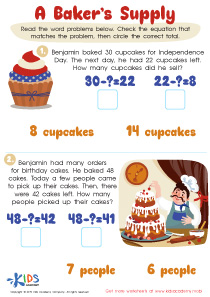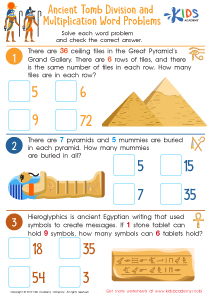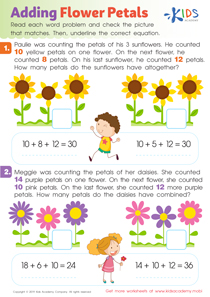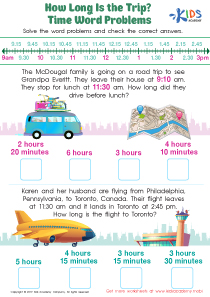Length and Mass Word Problems Worksheets for Ages 3-4
1 filtered results
-
From - To
Introduce your little ones to the basics of measurement with our Length and Mass Word Problems worksheets, tailored specifically for children aged 3-4 years. These learning homework sheets are designed to spark curiosity and develop early math skills in a fun and engaging way. Through a series of beautifully illustrated exercises, your child will explore concepts of length and mass, comparing and understanding differences in a simple, child-friendly format. Perfect for at-home learning or supplemental educational activities, these worksheets will provide a solid foundation for future mathematical concepts while keeping your preschooler entertained and informed.
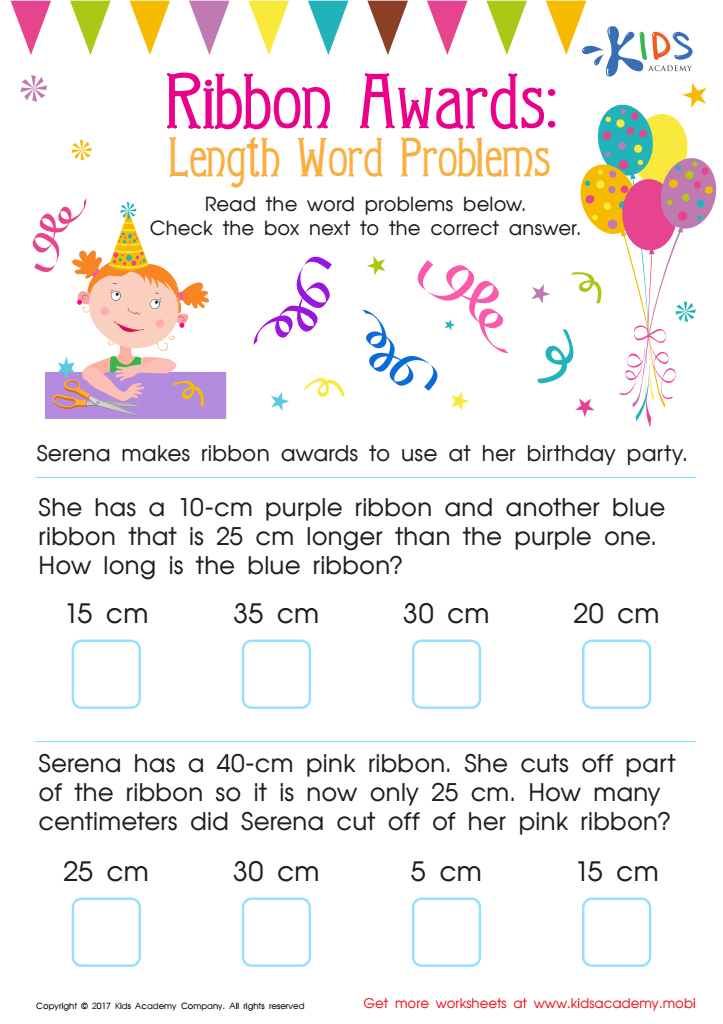

Length Word Problems Worksheet
Educational Worksheets on Length and Mass Word Problems: A Vital Tool for Early Development
In the early stages of childhood education, particularly for children aged 3-4 years, the integration of educational worksheets tailored to concepts like length and mass can be extraordinarily beneficial. These worksheets are not just sheets of paper with numbers and questions; they are pivotal tools designed to enhance cognitive development, introduce basic mathematical concepts, and build foundational skills in young learners.
The Importance of Understanding Length and Mass
Length and mass are fundamental aspects of measurement that children encounter in their everyday lives. Whether it's comparing the heights of two objects, weighing fruits, or choosing the right amount of clay for a project, these concepts are integral. Educational worksheets on length and mass word problems are crafted to make these abstract concepts tangible and understandable for young minds.
Cognitive Development
For children aged 3-4, brain development is rapid. Educational worksheets that involve solving length and mass word problems help in nurturing logic and reasoning skills. They challenge young learners to think critically as they attempt to understand the problem and apply their knowledge to find solutions. This early introduction to problem-solving boosts cognitive processes and paves the way for complex thinking skills.
Learning Through Play
One of the primary advantages of these educational worksheets is that they can be designed to be interactive and playful. Length and mass word problems can be themed around animals, fairy tales, or everyday scenarios that resonate with young children. This makes learning not only more engaging but also ensures that it occurs in a stress-free and enjoyable context. When children associate learning with fun, their motivation to continue discovering new concepts grows.
Building Mathematical Foundations
Early exposure to basic mathematics through length and mass word problems is crucial. These worksheets serve as an introductory platform for arithmetic operations like addition and subtraction, which are often incorporated into solving these problems. By applying these operations in practical scenarios, children can better understand and remember mathematical concepts, setting a solid foundation for advanced studies in the future.
Enhancing Communication Skills
Discussing and solving word problems on educational worksheets requires a certain level of language skill. Children need to comprehend the problem, discuss their thoughts if in a group setting, and articulate their reasoning. This practice significantly enhances their vocabulary and communication skills, which are essential for all areas of learning.
Encouraging Individual Learning and Assessment
Worksheets on length and mass allow educators and parents to identify individual strengths and weaknesses in a child's learning process. They provide a clear picture of a child’s understanding and where they might need more support. Additionally, these worksheets can be tailored to the individual learning pace and ability of each child, ensuring that they are neither too challenging nor too simplistic. This customized approach helps in fostering a positive learning experience and encourages self-paced learning.
Development of Fine Motor Skills
Handling educational worksheets often involves writing, drawing lines, or circling items, which are activities that enhance fine motor skills. As children engage with length and mass word problems, they practice holding pencils, drawing straight lines or curves, and other hand movements that are crucial for their motor development. These skills are fundamental not only for writing but also for other everyday tasks.
Parent-Child Interaction
Educational worksheets provide a wonderful opportunity for parents to get involved in their children’s early education. Working together on length and mass word problems can enhance the parent-child bond and allow parents to directly observe and nurture their child’s educational journey. This direct involvement can also lead to better understanding of the child’s educational needs and learning style, enabling more effective support at home.
Preparation for Future Educational Challenges
Starting with simple length and mass word problems at an early age prepares children for the structure and demands of formal schooling. As children grow, the complexity of problems they encounter will increase. Having a strong early foundation with the help of educational worksheets will make these transitions smoother and less intimidating for young learners.
Conclusion
In conclusion, educational worksheets on length and mass word problems are much more than just paper tasks—they are a comprehensive educational tool that supports early childhood development in multiple dimensions. From enhancing cognitive abilities and mathematical foundations to improving fine motor skills and communication, these worksheets play a crucial role in preparing young children for future academic success and everyday life challenges. For parents and educators of children aged 3-4 years, incorporating these worksheets into the learning curriculum can make a significant positive impact on their developmental journey, making them an invaluable resource in the realm of early education.
 Assign to the classroom
Assign to the classroom
